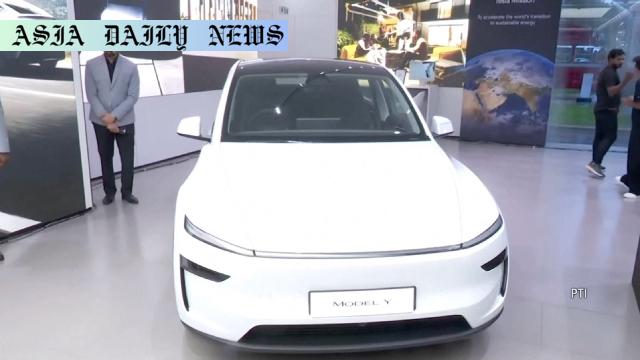Tesla ventures into India’s expanding EV market with flagship Mumbai showroom, paving the path for a bold new chapter in sustainable mobility.

Tesla’s Entry into the Indian Market: A Strategic Investment
Tesla, the renowned American electric vehicle (EV) manufacturer led by billionaire entrepreneur Elon Musk, has taken its first major step into India with the opening of a flagship showroom in Mumbai, the country’s largest commercial city. This move is a pivotal moment for Tesla as it seeks to tap into one of the world’s largest and fastest-growing car markets, currently ranked third globally after China and the United States. The debut of the showroom signifies Tesla’s commitment to gaining a strong foothold within India, which, while still nascent in terms of EV adoption, presents vast potential for growth.
The Indian EV Market: Challenges and Opportunities
Despite India being a major car market, the adoption of electric vehicles in the country remains low, accounting for a mere fraction of overall sales. According to the Society of Indian Automobile Manufacturers, the sale of EVs in 2024 was approximately 100,000 units – a relatively modest figure when compared to the volume of traditional internal combustion engine cars. However, with increasing public awareness of environmental sustainability and government initiatives encouraging EV adoption, the market is poised for significant expansion. Tesla’s introduction of the Model Y, priced at around $70,000 (6 million rupees), is aimed at establishing the brand’s premium positioning, targeting affluent buyers while also sparking curiosity and interest among car enthusiasts and environmental advocates.
India’s Transition to Sustainable Transportation
The Indian government has taken noteworthy measures to accelerate the transition to electric vehicles, including tax incentives and reduced duties on EV imports. However, the high price point of Tesla’s Model Y may pose a challenge for mass adoption given the price-sensitive nature of Indian consumers. Nevertheless, by positioning itself as a luxury and status-oriented brand, Tesla has the opportunity to appeal to the nation’s burgeoning affluent urban class who value innovation, sustainability, and state-of-the-art technology. Securing India’s trust and building a strong brand presence will be integral to Tesla’s success in this competitive market.
Global Challenges and Competition
Tesla faces several hurdles globally that could impact its ventures in India. Amid intensifying competition from domestic companies in markets like China, alongside rising international criticism tied to Elon Musk’s political and corporate decisions, the company is navigating a tumultuous landscape. Additionally, several consumers have boycotted Tesla’s products, citing discontent over Musk’s controversial activities. In India, competition from local EV makers, such as Tata Motors and Mahindra, as well as startups like Ola Electric, could present formidable challenges for Tesla. That said, buyer interest in Tesla’s innovation-driven engineering might still tilt the scale in its favor.
Expansion Plans: New Delhi and Beyond
Tesla’s venture into India doesn’t stop at Mumbai. Reports indicate that the company plans to open another showroom in the capital city of New Delhi by the end of July. Such an expansion underscores Tesla’s ambitions to capture a significant share of India’s emerging EV landscape. With its strong brand recognition and reputation for groundbreaking technology, Tesla has the potential to transform the Indian automobile industry while aligning with the country’s environmental sustainability goals.
Commentary
Tesla’s Indian Debut Is a Bold, Yet Timely Move
Tesla’s entry into the Indian market comes at an opportune time, albeit with its own set of challenges. As India shifts towards greener and more sustainable technologies, Tesla’s presence brings a fresh perspective to electric mobility. The company’s decision to launch in Mumbai, a city synonymous with affluence and economic activity, shows that Tesla intends to position itself as a premium offering appealing to urban elites. This strategy, though potentially limiting broader adoption due to high vehicle prices, can establish its reputability and long-term market presence.
A Market Poised for Transformation
India’s status as the third-largest automobile market in the world highlights its potential to embrace electric vehicles. However, the road ahead is not without obstacles. Tesla’s pricing strategy may alienate a large portion of the car-buying population, making broader adoption difficult without plans to localize production and reduce costs. That said, if Tesla can leverage government incentives for EV imports and contribute to India’s EV transition goals, it could pave the way for more affordable models to follow in the future.
Global Factors and Tesla’s Resilience
Tesla’s multinational grounding ensures its strategies are globally informed, but the backlash Elon Musk has faced on the world stage may still affect India’s perception. Nonetheless, the company’s innovative technology and cutting-edge engineering could override such concerns. By fostering sustainability and showcasing the benefits of EV usage, Tesla could reshape not only how cars are viewed but also how a nation integrates them into its infrastructure.


